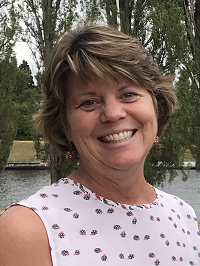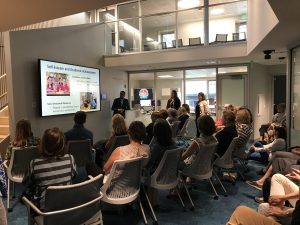 We asked Susan Barley to share what she learned while visiting the UW Libraries and the Institute for Learning and Brain Sciences during the second half of our Annual Summer Outing at University of Washington. Susan Barley has been a member of WA Women’s Foundation since 2013 and has served on the Pooled Fund Grant Committee (Education, Environment, Health, and Human Services) as well as the Impact Assessment Committee.
We asked Susan Barley to share what she learned while visiting the UW Libraries and the Institute for Learning and Brain Sciences during the second half of our Annual Summer Outing at University of Washington. Susan Barley has been a member of WA Women’s Foundation since 2013 and has served on the Pooled Fund Grant Committee (Education, Environment, Health, and Human Services) as well as the Impact Assessment Committee.
After lunch, we walked to the heart of the UW campus to the Suzzallo Library. This collegiate gothic building was the dream of then UW President Henry Suzzallo; he wanted the imposing structure to signal the sophistication and importance of Washington. He was promptly fired for his hard work. Nevertheless, the beautiful façade, grand staircase and “Harry Potter” reading room remain as testimony to his aspirations to showcase UW as a top public university in the early 1900s.
As we walked through the Suzzollo Library, its brutalist 1960’s expansion, and the newer adjacent Allen Library, we could see the continuing importance of central libraries on university campuses. Students may no longer check out books, but they thrive when there are quiet study areas, collaborative areas for working in groups, video centers and other “modern” facilities that reflect our exciting virtual world. UW has it all in the Suzzallo and Allen libraries. By the way, they are open to the public.
 We switched gears by walking across campus to the Montlake Cut, to visit the Institute for Learning and Brain Sciences (ILABS). We were treated to several presentations about ILABS research related to human learning. ILABS has 2 core missions: basic research in early childhood development, which involves infants to 5 years, including brain scans; and dissemination of scientific learnings in childhood development to the world so the research can become directly applicable to the real world. Their work is exciting and wonderful.
We switched gears by walking across campus to the Montlake Cut, to visit the Institute for Learning and Brain Sciences (ILABS). We were treated to several presentations about ILABS research related to human learning. ILABS has 2 core missions: basic research in early childhood development, which involves infants to 5 years, including brain scans; and dissemination of scientific learnings in childhood development to the world so the research can become directly applicable to the real world. Their work is exciting and wonderful.
One researcher is working on bilingualism. Another is investigating obstacles to math cognition in girls, a reality that many of us are familiar with. An example: by age 3, we understand that we are girls. By age 7, girls and boys are socially exposed to “girls don’t do math”. By age 8, girls say “I” don’t do math. Another researcher is investigating how early infants develop a sense of self.
ILABS works to place its learnings into the hands of folks who can use them. They partner with education providers and parents. They provide online tools and trainings for teachers and others, receiving feedback that helps refine the programs.
After the presentations, we had an informal gathering on the back deck of ILABS, where we could talk with the researchers and each other, while looking at the lovely Montlake Cut. It was a perfect end to a great day.
Susan, You are my hero!
Marcia Bailey